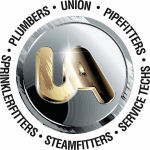September 2011 -The United Association of Journeymen and Apprentices of the Plumbing and Pipe Fitting Industry of the United States and Canada (UA) has announced it has adopted the National Commission for the Certification of Crane Operators (NCCCO) Signalperson certification as the recommended standard for all its members involved with cranes and lifting operations.
 “The United Association is convinced that the NCCCO signalperson certification program significantly enhances the safety of lifting operations and of our working men and women,” said UA General President, William Hite. “By taking matters to the next level, the UA has been able to demonstrate its ability to improve its methods of training and certification to keep pace with the ever-changing landscape of construction practices in today’s world.”
“The United Association is convinced that the NCCCO signalperson certification program significantly enhances the safety of lifting operations and of our working men and women,” said UA General President, William Hite. “By taking matters to the next level, the UA has been able to demonstrate its ability to improve its methods of training and certification to keep pace with the ever-changing landscape of construction practices in today’s world.”
UA began working together with NCCCO last year to institute the CCO Signalperson certification program for its membership. Following a review of the recent changes to the federal safety regulations for construction crane operations UA Director of Training, Michael Arndt, established a training program for signalpersons.
“We quickly recognized that a comprehensive evaluation process was needed to ensure that those individuals completing the training fully understand the responsibilities and activities of a signalperson,” said Arndt. “UA selected the CCO signalperson certification program as the best model to address the union’s needs while also providing an independent, third-party certification for our members.”
Since the first signalperson examinations in November 2010, more than 1,000 UA members have been certified as CCO Certified Signalpersons. The assessment results have stimulated UA’s training program as well as given due recognition to the professional skills required for safe crane operations.
“In today’s competitive environment all industrial facilities have to consider the critical issue of rigging and lifting operations as a key factor in the continued productivity of their business,” said Arndt. “Industrial rigging, in particular, is a major focus for electric utilities, oil refineries, manufacturing plants, paper mills, and chemical plants”